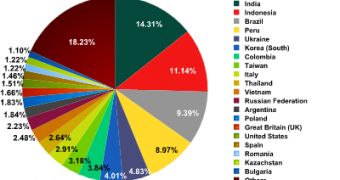It seems as the geography of spam has changed in the past year. While in 2010 the U.S. and Europe were leaders, this year Asia and South America seem to be the place from where most malicious campaigns are launched.
A recent study made by Kaspersky reveals that the sources are mainly located in countries that up until now didn't present as much of a threat. The first 8 from the top 10 list, when it comes to distributing malware containing email, are from the above mentioned places.
India, Indonesia, Brazil, Peru and Ukraine took up almost half of the pie chart drawn up after the completion of the research.
Kaspersky experts studied the fluctuations in these countries with the purpose of determining a precise geographic distribution of botnets, which might lead to results that could help in establishing individual groups responsible for the attacks.
Eleven states were included in the analysis and they were closely monitored for a period of four months. Results show that spam is distributed simultaneously from certain groups.
For instance, India and Brazil seem to have the same fluctuations which might very well mean that the same group of hackers control both of them.
The research wasn't expected to generate exact results, minor differences being caused by local botnets, unaffiliated to large organization.
Other similarities were documented between Ukraine, Taiwan and Thailand and others between Indonesia and Peru.
The study also showed that Brazil and India represent the source for almost a quarter of the world's spam traffic which means that, after McAfee's optimistic quarterly report, things have started to stray off course and malicious activities in the form of email messages are beginning to regain lost ground.
It is believed that after a few successful anti-botnet campaigns, cybercriminals moved their operations to other countries which do not yet have a legal and informational system developed to counterattack these sort of activities.

 14 DAY TRIAL //
14 DAY TRIAL //